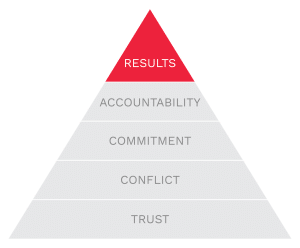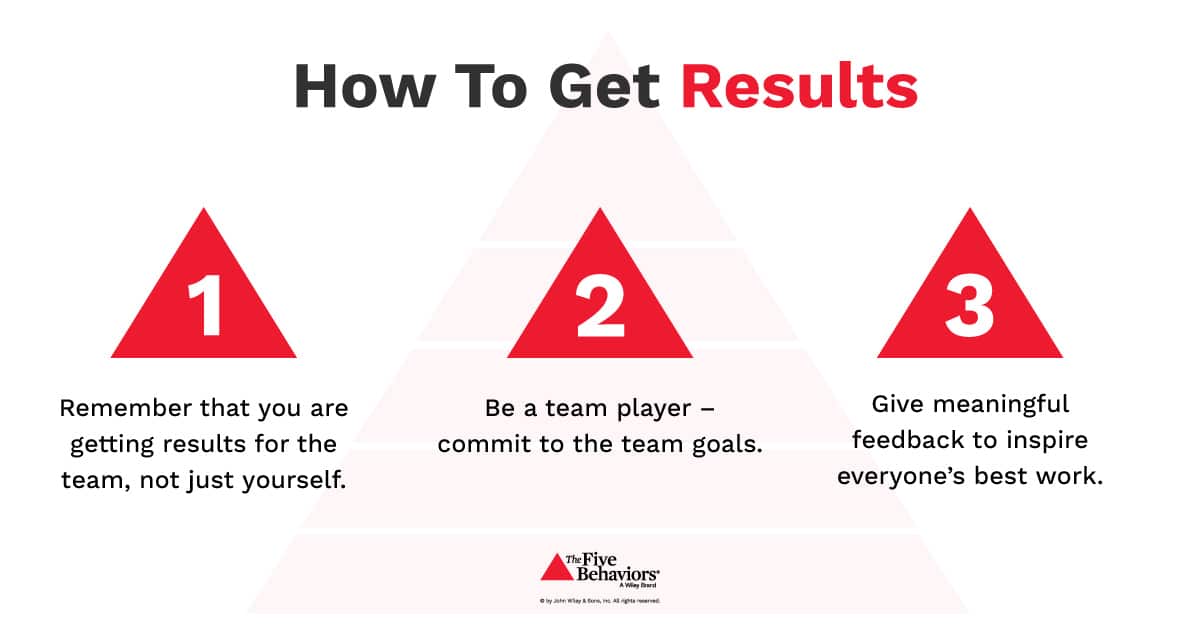Why do teams exist? Put simply: the purpose of a team is to get results. While the purpose may be simple, the path to get there can be quite complex. Getting great results requires a team where everyone is committed to success. There are many ways individual team members can contribute to a culture of results on their team, even if they are not in leadership positions.
Whether most of your work happens on one long-standing team, or you’re someone who moves between many shorter-term project teams, knowing how to be a good teammate is essential.
This article is the final in a series on how individuals can build teamwork skills. (See the previous articles on trust, conflict, commitment, and accountability.) We’re using the Five Behaviors® model developed by Patrick Lencioni.
What does the Five Behaviors® model say about results?
Quite simply, the ultimate goal of the Five Behaviors model is the achievement of results. Cohesive teams provide other areas of satisfaction, such as the enjoyment of collaborating with people you trust, or the invigoration of hashing out ideas productively. But the true measure of how your team is functioning will be seen in the results it produces.

The Five Behaviors® Personal Development profile defines results as “the collective goals of the team; they are not limited to financial measures, but are more broadly related to expectations and outcome-based performance.”
Why would a team focus on anything other than results? Members may be more focused on status or may spend time enhancing their own positions, at the expense of the team. Teams that fail to concentrate on results stagnate, become distracted, and lose achievement-oriented team members.
“In every successful team, nothing becomes bigger than winning. And when other things become bigger than performing, and the will to win, that is when the culture is no longer good enough.”
How do results connect to accountability?
Results are the final piece of the Five Behaviors model—the top of the pyramid. They rest on the foundation built by the four other behaviors. Results come after a team learns to practice accountability. If teammates don’t hold each other accountable, they will be more likely to shift their attention to their own needs and to individual advancement.
Here are the ways that accountability practices lay the groundwork for achieving results:
- Calling out problems and inefficiencies in a timely fashion means the team can clear obstacles and ensure processes are running smoothly.
- Embracing feedback from teammates means you can minimize errors in your work and meet high standards.
- Giving feedback helps create a climate where people address concerns before they turn into problems.
Why is it hard to get results?
“Individualism wins trophies, but teamwork wins championships.”
To reach their highest potential, teams must master all five behaviors of a cohesive team. This means they trust one another, engage in conflict around ideas, commit to decisions, hold one another accountable, and focus on achieving collective results. It is difficult to achieve results because teams so often don’t have the foundation of the other behaviors on which to build their work.
When teams are dysfunctional, individuals tend to pursue their own goals rather than make sacrifices for the team. Building a cohesive team requires individuals to call upon mindsets and responses beyond their default settings. This takes energy. So, if the team’s a mess, individuals might wonder why they should bother extending themselves in this way, especially if other team members aren’t doing so.
In addition, few of us learn teamwork skills in the same way we learn other skills required for our jobs. Research shows a critical “teamwork skill gap” in the workforce. Although working on teams is a complex undertaking, there are certain skill sets you can break down and practice that will increase your value as a team member across workgroups.
How individuals can help their teams get results
“No one on a cohesive team can say, ‘Well, I did my job. Our failure isn’t my fault.’”
Here’s how you as an individual team member can encourage a results-oriented team culture:
- Shift your mindset to really embrace collective results over individual advancement.
- Build on the strengths you already have.
- Identify your motivators and use them to push toward results.
- Develop habits that lead to results.
Shift your mindset to embrace collective results
Prioritizing the team’s results above all else means you:
- value collective success more than individual achievement
- willingly make sacrifices in your area for the good of the team
- take personal responsibility when the team fails
- are quick to point out the contributions of others
You may sometimes find it difficult to put aside your personal goals when they conflict with those of your team, but remember that everyone benefits when the team does well. Trust that as part of a successful team, you will establish a track record of achievement that will help you develop and advance personal initiatives as well.
Build on your strengths
Everyone will have aspects of their personality that are helpful in the pursuit of collective results, as well as aspects that are not as helpful. For example, someone with a CD DiSC style is great at holding the team to high standards but may struggle with adjusting their plans to accommodate people’s emotional needs. An iS-style person excels at giving praise and inspiring others but may find less success when they need to focus on analytical tasks.
The Five Behaviors Personal Development assessment can help you understand what strengths you already have that will help with team results. You can continue to build from there. Here are a few examples:
- If you’re naturally methodical, you can dedicate care and focus to some of the more time-consuming tasks that are essential to achieving results.
- If you’re naturally supportive, you will be ready to lend a hand to assist any teammates in need of support.
- If you’re naturally driven, you’ll be able to keep the team focused on the finish line and eliminate obstacles.
- If you’re naturally collaborative, you’re good at keeping the collective in mind rather than focusing on your individual ego.
- If you’re naturally enthusiastic, you can buoy team spirit and build excitement that keeps the project moving along.
- If you’re naturally focused on accuracy, you can make sure things get done the right way, and help devise more efficient methods to reach the goal.
Use what motivates you
With many aspects of work life, identifying your motivators and stressors is key to moving forward with self-awareness. Strengths like the ones mentioned above grow out of your core motivators, so it’s helpful to dig down and understand them. To help drive toward results, draw on those aspects of your work life you already find motivating to help your teams stay focused on collective results.
Five Behaviors Personal Development will help you identify your motivators and articulate how to turn this knowledge into action. Here are some examples of motivators and how they can be leveraged in service of results.
Providing in-depth analysis: Not everyone has the discipline you have to dig deep into a topic until you’ve mastered it. You refuse to accept new ideas or plans at face value and can uncover problems others may not foresee.
Inspiring others: When you’re excited about something, your enthusiasm is contagious. You bring optimism and passion to your work, energizing team members to work toward the end goal.
Being in charge: When a team seems rudderless, you can step up and focus the group’s attention on doing what’s necessary to achieve results.
Maintaining stability: You like to minimize surprises and keep your world running smoothly, which means you’re motivated to put out fires and perform routine maintenance on projects that others might neglect.
All of these mindsets are critical to success, and if one is lacking on a team, team members might need to stretch themselves to take on those roles.
Develop habits that lead to results
Once you understand your motivators and natural strengths around getting collective results, you can work to develop the teamwork skills that come less naturally to you. Your Five Behaviors Personal Development profile will give you personalized guidance on putting these skills into practice. Below are some examples of growth opportunities for people of various personality styles.
For people who value stability: Experiment with shaking up your routine. If you have a preference for the status quo, you may not recognize innovations or improvements that can help the team reach its goals in a faster, more efficient, or more meaningful way. Be willing to try out new approaches from time to time.
For people who never slow down: Take a moment to acknowledge your teammates’ contributions. You may be so focused on moving forward that you don’t see the benefit in stopping to offer praise to your teammates. Remember that acknowledgment is an important motivator for others that can build goodwill and maintain the team’s focus on results.
For people who value relationships: Take failure seriously. Don’t let a fear of injuring your relationships with teammates lead you to tolerate setbacks or mediocre performance. Instead of sweeping issues under the rug, draw on your people skills to encourage improvement.
For people who like working independently: Be proactive about supporting your teammates. If your default mode is to focus on your own tasks and responsibilities, it may not always occur to you to look for ways to help out teammates. When you have additional capacity, offer to assist colleagues who are overburdened. Take the time to share information that may benefit a teammate, even if it does not fall directly within your role to do so.
Be a better teammate
Gaining proficiency with teamwork likely won’t be linear progress. There will be many learning moments as you develop your skills. But the stronger your teamwork muscles get, the more likely you are to become the teammate everyone wants to work with.
As we wrap up this series on how individuals can improve their teamwork skills, we acknowledge that one individual can’t create a cohesive team. Great teams require buy-in from all team members. But when a team member encourages their groups to have honest discussions about how to work together, and when they model skillful teamwork themselves, it can be contagious.


